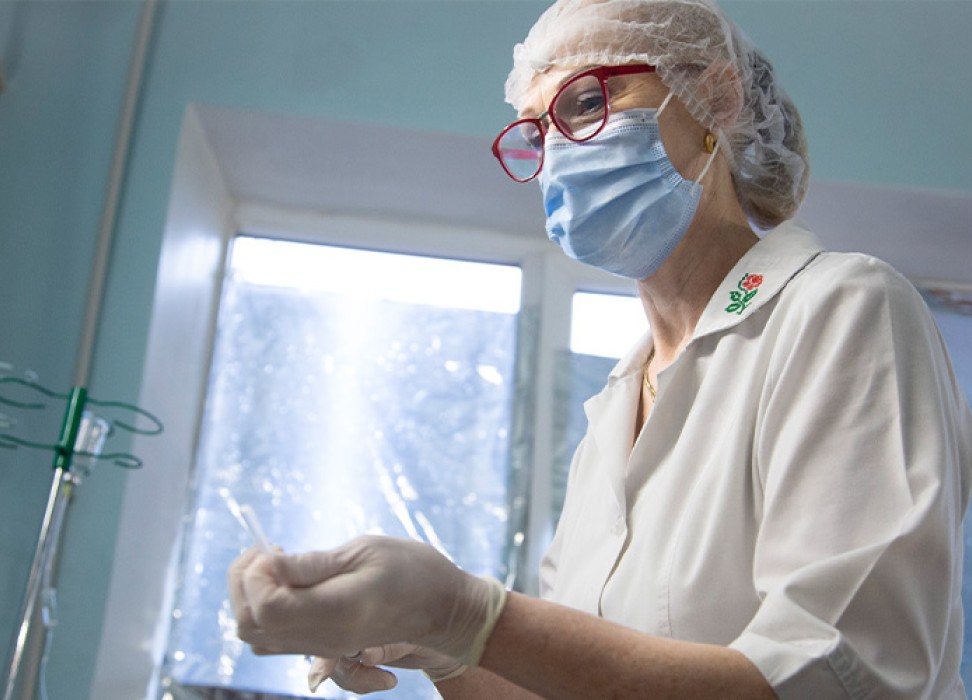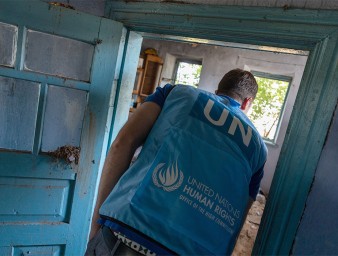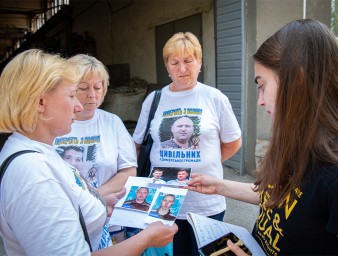“We are devoted to this work because the health and lives of people are at stake.”
16 August 2021

“We don't just work a lot,” said Svitlana Panarina, a nurse from conflict-affected Toretsk in eastern Ukraine. “We work non-stop. This is not an office where you can just go home at 5 pm, leaving some tasks for tomorrow. We are devoted to this work because the health and lives of people are at stake.”
Healthcare workers in Ukraine – 83 per cent of whom are women – were in a vulnerable situation even before the COVID-19 pandemic started. With salaries below the national average, unhealthy and unsafe working conditions and inadequate social security, the situation of healthcare workers in the country has only worsened during the pandemic.
At the time of writing, COVID-19 confirmed cases in Ukraine are again on the rise. Since the pandemic started, there have been more than 2.2 million cases and around 53,000 deaths.
Panarina has been working as a therapeutic nurse in Toretsk City Hospital for three years. She said they were only partially prepared for the pandemic through attending courses and trainings, but the situation evolved quite rapidly.
She recalled the time when there were only three nurses and one doctor left in her department, when oxygen concentrators were lacking, and it became impossible to treat people.
The right to health under threat
As reported by the UN Human Rights Monitoring Mission in Ukraine, increased workloads, insufficient time for rest and inadequate wages forced many healthcare workers to leave their jobs. According to the State Statistical Service, the number of healthcare workers decreased by 5.4 per cent in 2020 – from 777,000 in January to 734,900 in December (this, however, is also partially due to the ongoing healthcare reform).
“The shortage of qualified healthcare staff has already had, and will inevitably continue to have, a negative impact on the population’s right to health, including access to, and the quality of, essential services,” says Matilda Bogner, Head of the UN Human Rights Monitoring Mission in Ukraine.
Ambulance crews have decreased in the city of Kharkiv, for example, resulting in extended shifts of up to 16 hours, lack of disinfection of vehicles and inadequate breaks for the staff, to name only a few concerns.
While the Ukrainian government has tried to address the issue of remuneration of healthcare workers by introducing temporary bonuses for those involved in the pandemic response, there are concerns about the lack of transparency in their distribution, lack of equal pay for work of equal value and further widening of the gender pay gap.
Some bonuses, for instance, were larger for doctors than mid-level and junior health care staff, who are mainly women. Additionally, the up to 300 percent salary bonuses for medical staff introduced by the government were only provided to those who work in medical facilities where people with confirmed COVID-19 cases were hospitalised and treated. Thus, not all healthcare workers who were in contact with COVID-19 patients, like family doctors, were entitled to this remuneration.
Further, out of the more than 55,000 cases of healthcare workers infected by COVID-19 by 31 December 2020, only a small percentage were recognised by the authorities as work-related, impeding the workers’ right to compensation.
“In line with its international human rights obligations and national commitments, Ukraine should significantly increase its investment in the health sector to improve working conditions for healthcare workers,” said Bogner. “They should be provided with decent pay, occupational health and safety and social security, and consulted about policy-making at all levels, including through trade unions.”
Mental health needs, ineffective trade unions
One of the issues that also became visible and urgent during the pandemic was the lack of mental health and psychosocial support services available to healthcare workers in Ukraine.
“We don’t have any kind of help like that,” said Panarina. “Instead, we cope by supporting each other and rejoicing when we have the opportunity to help someone and when patients leave us in good health. This is the only way to cope emotionally.”
In the report, some healthcare workers claimed that healthcare trade unions, which should be supporting healthcare workers and advocating for their rights, were not effective, and that healthcare workers blowing the whistle on issues of concern have not been protected. At the same time, healthcare unions stated they were not effectively consulted (neither at the national nor local level) about the government’s COVID-19 response.
When asked whether she was afraid to work during the COVID-19 pandemic, Panarina said “no” without hesitation. Despite all the challenges they faced, many healthcare workers did not give up, she said, and instead became even more resilient and began fighting and advocating for their and others’ rights.
Panarina is now passionate about “helping our health workers remember their dignity, and teaching them to defend their rights.
I want to see our people without fear in their eyes.”
16 August 2021



